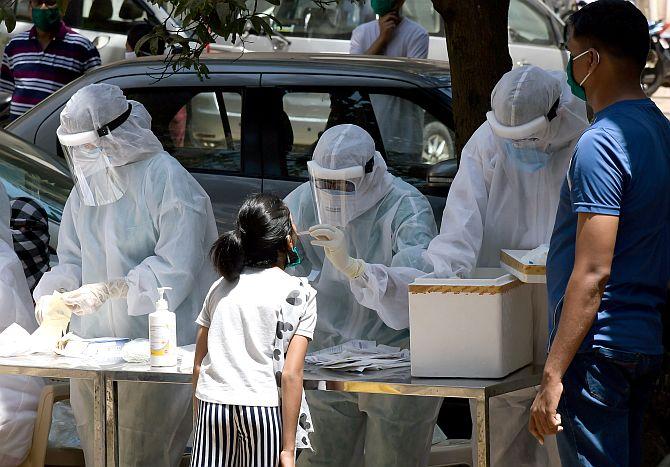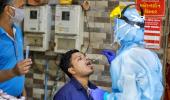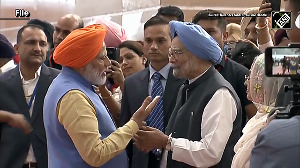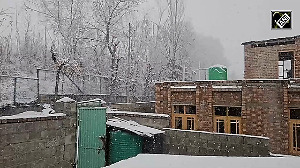Revising its strategy to fight the spread of COVID-19, the Indian Council of Medical Research on Thursday said people having symptoms like fever, cough, sore throat and runny nose and residing in hotspots or cluster areas and in evacuee centres will now be tested for coronavirus infection.

Till now, all hospitalised patients with severe acute respiratory illness, shortness of breath and having fever and cough were being tested for COVID-19 infection.
Also, asymptomatic direct and high-risk contacts of a confirmed case are also tested once between day 5 and day 14 of coming in his or her contact.
Besides, all asymptomatic individuals who undertook international travel in the last 14 days and developed symptoms, all symptomatic contacts of laboratory-confirmed cases and all symptomatic healthcare workers were being tested for the infection as per the guidelines.
In hotspots or clusters and in large migration gatherings and evacuee centres, all symptomatic influenza-like illness (fever, cough, sore throat, runny nose) will be tested for rRT-PCR within seven days of illness and after seven days of illness antibody test will be conducted -- if negative, confirmed by real-time reverse transcription polymerase chain reaction or rRT-PC test.
The apex body for biomedical research revised its strategy in view of a spurt in coronavirus cases in the country this week.
The new strategy aims to contain the spread of infection more effectively and to provide reliable diagnosis to all individuals meeting the inclusion criteria of COVID-19 testing.
The death toll due to the novel coronavirus rose to 169 and the number of cases climbed to 5,865 in the country on Thursday registering an increase of 591 cases since Wednesday, according to the Union Health Ministry.
However, a PTI tally of figures reported by various states as on Thursday showed at least 6624 cases and 225 deaths.
There has been a lag in the Union Health Ministry figures, compared to the number of cases and deaths announced by different states, which officials attribute to procedural delays in assigning the cases to individual states.
Many with respiratory infection test COVID-19 positive
About 40 per cent of COVID-19 cases with severe acute respiratory infection did not have any history of contact with a positive patient or international travel, and they were reported from 36 districts of 15 states, an Indian Council of Medical Research study released on Thursday while recommending these places for priority containment measures.
A total of 104 of the 5,911 patients with severe acute respiratory infections (SARI) tested positive for COVID-19, out of which 40 cases did not report any history of contact with a known case or international travel, according to the study which was conducted from February 15 to April 2.
The chances of getting infected among SARI patients increased from 0 per cent before March 14 to 2.6 per cent by April 2.
Also, males accounted for higher number of COVID-19 cases and also patients aged above 50 years of age.
According to the study, which has been published in the Indian Journal of Medical Research, a total of (104) 1.8 per cent of the 5,911 SARI patients tested were positive for COVID-19.
These cases were reported from 52 districts in 20 states and union territories.
'In all, 39.2 per cent COVID-19 cases did not report any history of contact with a known case or international travel,' the study said while two per cent reported contact with a confirmed case and one per cent reported recent history of international travel.
Data on exposure history was not available for 59 per cent cases.
The ICMR in its study highlighted that COVID-19 containment activities need to be targeted in districts reporting positive cases among SARI patients and stated that intensifying sentinel surveillance for COVID-19 among SARI patients may be an efficient tool to effectively use resources towards containment and mitigation efforts, it said.
Sentinel surveillance among SARI patients can help identify the spread and extent of transmission of COVID-19, the Indian Council of Medical Research said.
The SARI surveillance was initiated in the early phase of the COVID-19 outbreak in India.
In India, the initial COVID-19 testing strategy included people who had international travel history with symptoms, symptomatic contacts of laboratory-confirmed COVID-19 patients and symptomatic healthcare workers managing respiratory distress/SARI.
In addition, to track the progression of the epidemic in the early phase, stored samples of SARI patients hospitalised since February 15 were also tested for COVID-19 under the Virus Research and Diagnostic Laboratory Network (VRDLN).
As part of the study, SARI patients admitted at 41 sentinel sites from February 15 onwards were tested positive for COVID-19 by real-time reverse transcription-polymerase chain reaction.
During the study, SARI patients were detected from eight districts in Maharashtra, six in West Bengal and five each in Tamil Nadu and Delhi.
In 15 states, more than one per cent of SARI patients were COVID-19 positive.
About a third of COVID-19 positive SARI cases did not have any history of contact with laboratory-confirmed case or international travel, and such cases were reported from 36 districts in 15 states.
These districts need to be prioritised to target COVID-19 containment activities, the study stated.











 © 2024 Rediff.com -
© 2024 Rediff.com -